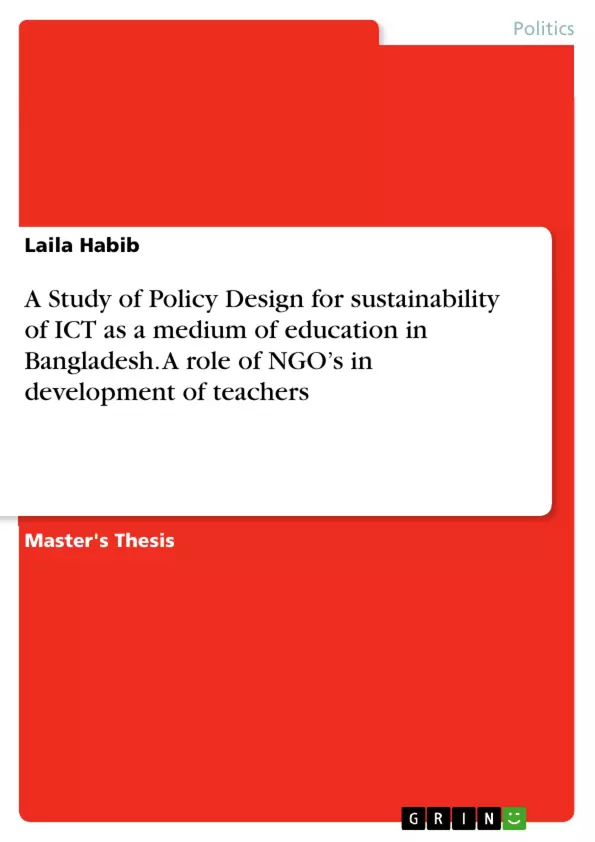This paper aims to critically investigate the sustainability and accountability of the different policies formulated by the government and their effectiveness when implemented in the education sector, mainly in the rural sector of Bangladesh. The national policies formulated by the government have been designed with a vision of achieving a target of digitization of the whole education sector by 2021. In the course of the research, a few objectives have been identified which will be critically analyzed to understand the constraints that exist and identify the gaps in the existing policies; this thesis also provides an analysis of the role of NGO’s in the development of teachers who are the main media for delivering education.
Inhaltsverzeichnis (Table of Contents)
- Aim
- Objectives
- Abstract
- Keywords
- Acknowledgement
Zielsetzung und Themenschwerpunkte (Objectives and Key Themes)
This research aims to critically evaluate the implementation of national education and ICT policies in Bangladesh, focusing on their impact on the development of competent teachers and the sustainability of ICT as an educational medium. It examines the effectiveness of these policies in creating a sustainable environment where information technology drives the vision outlined in the National ICT Policy 2009 and National Educational Policy 2010.
- Identifying factors hindering the infrastructural development and sustainability of ICT in Bangladesh
- Analyzing the government's role in formulating and implementing the national ICT and education policies
- Evaluating the role of NGOs in executing education and ICT policies
- Understanding teachers' perceptions and motivations towards embracing technological changes
- Proposing changes in both education and ICT policies based on an analysis of NEP 2010 and NIP 2009
Zusammenfassung der Kapitel (Chapter Summaries)
This research delves into the sustainability and accountability of government-formulated policies in the education sector, particularly in rural Bangladesh. The national policies aim to achieve complete digitization of the education sector by 2021. The research critically analyzes the constraints and gaps within these policies, exploring the role of NGOs in teacher development. It examines projects undertaken by UNESCO, A2i, and BRAC to understand the vital role of NGOs in policy execution. The research utilizes a qualitative approach, employing interviews with project managers, entrepreneurs, and teachers from educational institutions and NGOs involved in education development in Bangladesh.
Schlüsselwörter (Keywords)
The central keywords and focus topics of this research include information technology, policies, education, non-government organizations, sustainability, and development.
Frequently Asked Questions
What is the main goal of the national education policies in Bangladesh mentioned in the study?
The national policies, specifically the National ICT Policy 2009 and National Educational Policy 2010, were designed with the vision of achieving complete digitization of the education sector in Bangladesh by 2021.
What are the primary constraints to ICT sustainability in rural Bangladesh?
The study identifies gaps in existing policies and infrastructural development as major factors hindering the sustainability of ICT as an educational medium, particularly in rural areas.
What role do NGOs play in the development of teachers in Bangladesh?
NGOs like BRAC and UNESCO play a vital role in executing education policies and developing the competence of teachers, who are the primary media for delivering education and driving technological change.
How does the research analyze the effectiveness of the National ICT Policy 2009?
The research critically evaluates the implementation of the policy, focusing on its impact on creating a sustainable environment where information technology drives educational goals.
What research methodology was used in this study of policy design?
The study utilizes a qualitative approach, employing interviews with project managers, entrepreneurs, and teachers from various educational institutions and NGOs involved in Bangladesh's development.
- Quote paper
- Laila Habib (Author), 2015, A Study of Policy Design for sustainability of ICT as a medium of education in Bangladesh. A role of NGO’s in development of teachers, Munich, GRIN Verlag, https://www.grin.com/document/300458



